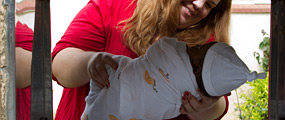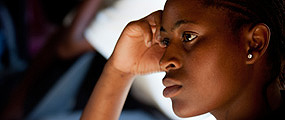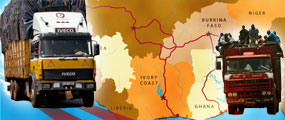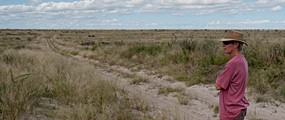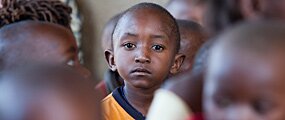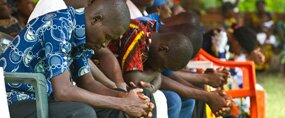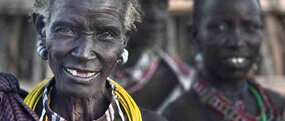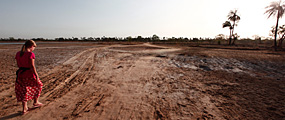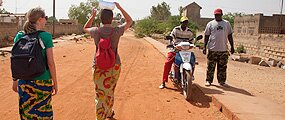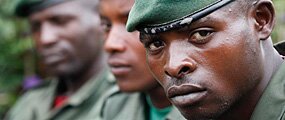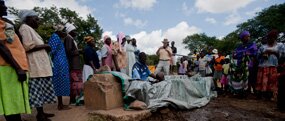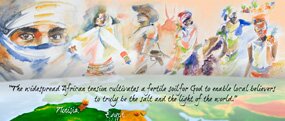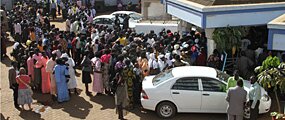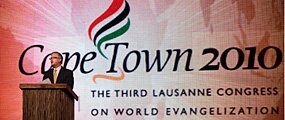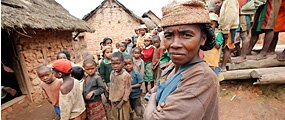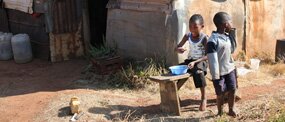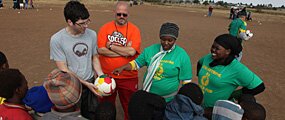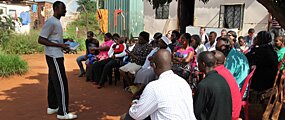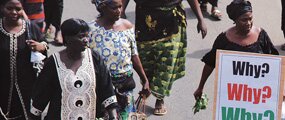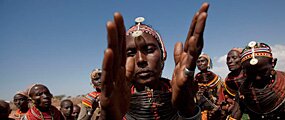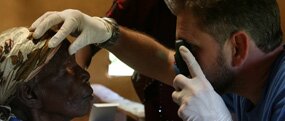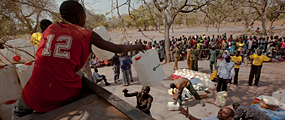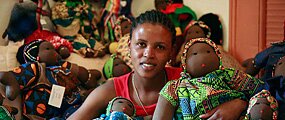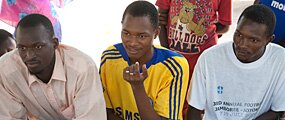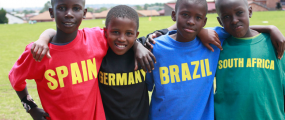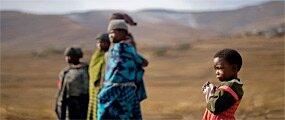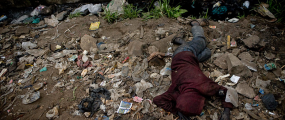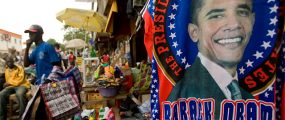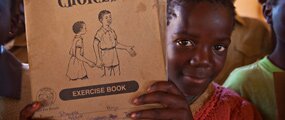Trafficking Increases in South Africa
Posted on April 8, 2010
SOUTH AFRICA – She was just a child, and she trusted him. He was her pastor. Yet he raped her, and no one believed her story.
Years passed, and Lisha* was betrayed by a friend who also raped her – again and again. As a pregnant youth, Lisha was rejected by her cynical, unforgiving mother. Kicked out of her South African home, abandoned by her family, Lisha had only her “boyfriend” to turn to. Tired of raping her alone, he gave her to his friends for the same purpose. Nothing is for free, and because he gave her a place to stay, he said that she owed him. Forcing her into prostitution was the next step, one that enslaved her and provided an income for him.
Gone were her youthful dreams of becoming a social worker. Ahead was a life of danger, illicit sex, physical and emotional abuse, forced slavery and an addiction to drugs.
 Lisha, age 32, has been trapped, transferred to another pimp, coerced into moving to another city, and sexually exploited. Lisha has been trafficked.
Lisha, age 32, has been trapped, transferred to another pimp, coerced into moving to another city, and sexually exploited. Lisha has been trafficked.
Human trafficking is the practice of deceiving someone or taking them against their will, selling, buying and transporting them into slavery. According to stopthetraffick.org, it is the second largest crime in the world, ranking just under drug trafficking. Two to four million men, women and children are trafficked across borders or within their own country every year. The United Nations’ “Global Report on Trafficking in Persons” stated that the most common form of human trafficking (79 percent) is sexual exploitation.
Currently in South Africa, it is not illegal to buy and sell humans; traffickers can only be prosecuted for kidnapping, sexual offenses or employing child labor. But law enforcement is difficult. And according to a Mail & Guardian Online article, “Sex Workers Set Sights on 2010,” many police officials support the legal experts who have created proposals to legalize prostitution. The proposals indicate police would be freed to focus on serious crime instead of petty vice, such as prostitution.
“It’s horrible what the sex industry actually does to women. And most of the ladies I work with – I would say 90 percent – are being trafficked,” says Charntel Paile, a Christian outreach worker with Action Labourers. Paile ministers among prostitutes in a prominent South African city. “By 10 a.m. the ladies are out in the street till the following morning. They’re really enslaved. The money that they make, they give to their pimps. They just get drugs and food, and they get beaten every day. They get abused by the pimps, they get abused by the police and they get abused by the clients. … They have lost hope, and they have lost who they are.”
Lisha is no stranger to the perils around her. One client picked her up, had sex with her, then held a gun to her head and took his money back. He pushed her out of the car with no shoes, no cell phone and no money. At a loss, Lisha hitched a ride from a truck driver who picked her up for the price of free sex. The next night, a man propositioned her and delivered her to an apartment where two other guys were waiting. They held knives to her throat and head, took turns raping her, then tossed her on the streets bleeding and without payment. Less than a week later, Lisha got in a man’s car, only to pass out immediately when he touched her. Several hours later, she woke up naked in a bush.
“I just want to leave this life,” says Lisha. “I don’t want to go on. I want to end the … drugs. I don’t want my child in this life. I don’t want her to see me in this life.”
She tried to run away, but her pimp came after her. He pulled her into a car, pushed her to the floor, took off his belt, and beat her until she thought she would die. “They just tell you in your face – straight – ‘There’s your house, here’s your wake-up [time], go to the streets next.’ And you can’t say nothing. You are far from your [home]. You must go, no matter what, whether you like it or not. It’s by force. … And if you don’t want to go, they beat you well. And you still have to go out after they beat you.”
 Human trafficking is a major problem in South Africa, and it’s increasing significantly with the coming of the FIFA World Cup™, a soccer tournament that is, arguably, the most-anticipated sporting event on earth. In the bizcommunity.com article “2010 FIFA World Cup boosts Africa’s human trafficking,” one trafficker said business has been booming since 2004, the year South Africa was chosen to host the World Cup. The source said close to 1,200 people have been trafficked into South Africa each year in anticipation of the event. It is expected that thousands of children and young adults within South Africa will also become victims.
Human trafficking is a major problem in South Africa, and it’s increasing significantly with the coming of the FIFA World Cup™, a soccer tournament that is, arguably, the most-anticipated sporting event on earth. In the bizcommunity.com article “2010 FIFA World Cup boosts Africa’s human trafficking,” one trafficker said business has been booming since 2004, the year South Africa was chosen to host the World Cup. The source said close to 1,200 people have been trafficked into South Africa each year in anticipation of the event. It is expected that thousands of children and young adults within South Africa will also become victims.
“This is an African World Cup and every African must somehow benefit from it,” one human trafficker told bizcommunity.com. “We are not criminals, and we have done nothing wrong. On the contrary, we are helping people help themselves and in the process, helping Africa to eradicate poverty and destitution. There is so much misery and hunger out there, and the [World Cup] is a golden opportunity to be seized with both hands.”
But Lisha does not want this “golden opportunity.”
“I’m fed up of everything now,” she says. “I can’t handle it [anymore]. I’ve had enough. It’s time for me to give my child a chance in my life.” Lisha’s greatest desire is to build a relationship with her daughter, who currently lives with an acquaintance in Lisha’s home city.
 Lisha’s urgency to flee has touched Paile’s heart. Paile’s desire is to help prostitutes escape from their pimps, take them to a rehabilitation center, and ultimately deliver them to a halfway house where they can learn skills and be reintegrated into society. “This is the method that God has given me when it comes to those ladies,” says Paile. “I go out on the street, I watch what they’re doing and build relationships with them, and I win them for Christ at the end.”
Lisha’s urgency to flee has touched Paile’s heart. Paile’s desire is to help prostitutes escape from their pimps, take them to a rehabilitation center, and ultimately deliver them to a halfway house where they can learn skills and be reintegrated into society. “This is the method that God has given me when it comes to those ladies,” says Paile. “I go out on the street, I watch what they’re doing and build relationships with them, and I win them for Christ at the end.”
She turns to the Bible and the story about the woman at the well. “She was an outcast in the community … because she had different men,” she explains. “But when she had an encounter with Jesus, she changed. She ran to the community, and everyone listened. And these are the very same ladies that we’re working with – the outcasts, the rejected, the ones that have lost being a woman. I know that when they have an encounter with Jesus, their life will never be the same.”
Lisha is desperate. Once more, she attempted to escape. But another trafficked victim reported her to their pimp. Lisha was severely beaten again. In tears, Lisha pleads, “I just need you guys to help me get out of this. That’s all.”
So far Paile’s efforts to release Lisha from bondage have not been successful, but she will not give up hope. She continually prays for deliverance for the ladies, for the pimps to be changed, and for the clients to lose their love of lust. But she is emotionally crushed that fear and a lack of funds cause rehabilitation centers, churches and individuals to not open their doors to the prostitutes seeking help. Paile challenges Christians “to do something … to really go out of your comfort zone and do something for God, and help change the nations.”
To get involved in Paile’s ministry among prostitutes, contact her at charntel.paile [at] gmail.com.

